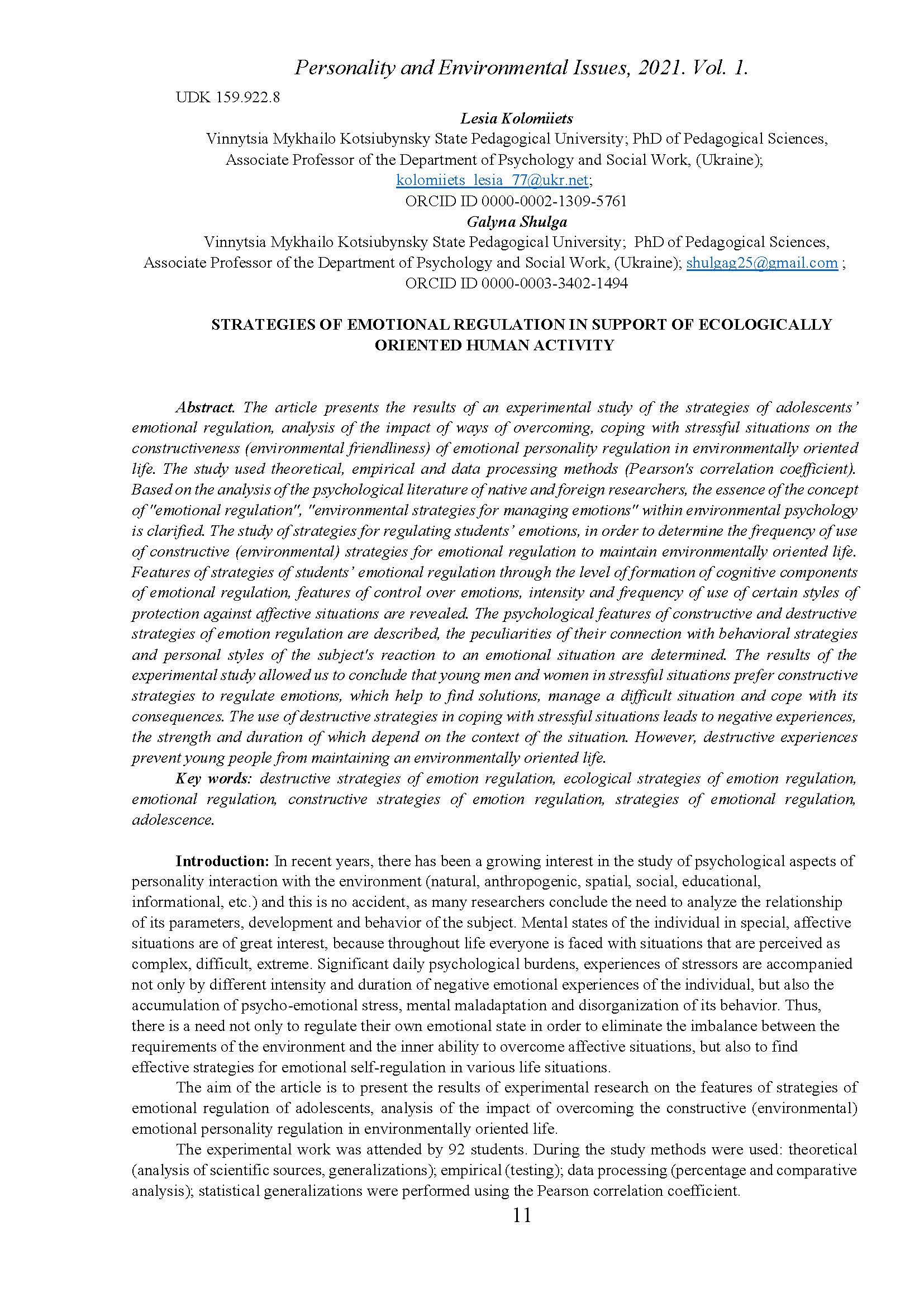Abstract
The article presents the results of an experimental study of the strategies of adolescents’ emotional regulation, analysis of the impact of ways of overcoming, coping with stressful situations on the constructiveness (environmental friendliness) of emotional personality regulation in environmentally oriented life. The study used theoretical, empirical and data processing methods (Pearson's correlation coefficient). Based on the analysis of the psychological literature of native and foreign researchers, the essence of the concept of "emotional regulation", "environmental strategies for managing emotions" within environmental psychology is clarified. The study of strategies for regulating students’ emotions, in order to determine the frequency of use of constructive (environmental) strategies for emotional regulation to maintain environmentally oriented life. Features of strategies of students’ emotional regulation through the level of formation of cognitive components of emotional regulation, features of control over emotions, intensity and frequency of use of certain styles of protection against affective situations are revealed. The psychological features of constructive and destructive strategies of emotion regulation are described, the peculiarities of their connection with behavioral strategies and personal styles of the subject's reaction to an emotional situation are determined. The results of the experimental study allowed us to conclude that young men and women in stressful situations prefer constructive strategies to regulate emotions, which help to find solutions, manage a difficult situation and cope with its consequences. The use of destructive strategies in coping with stressful situations leads to negative experiences, the strength and duration of which depend on the context of the situation. However, destructive experiences prevent young people from maintaining an environmentally oriented life.
References
Aldao, A., and Dixon-Gordon, K. L. Broadening the scope of research on emotion regulation strategies and psychopathology. Cogn. Behav. Ther., 2014, 43, 22-33. https://doi.org/10.1080/16506073.2013.816769
Campos, J. J., Frankel, C. B., and Camras, L. On the nature of emotion regulation. Child Dev., 2004, 75, 377-394. https://10.1111/j.1467-8624.2004.00681.x
Chujkova, L. Social'naya ekologiya: samoregulyaciya vzaimootnoshenij obshchestva s prirodoj, Astrahanskij vestnik ekologicheskogo obrazovaniya, 2017, 4 (42), 57-71.
Gross J. J., John O. P. Individual differences in two emotion regulation processes: Implications for affect, relationships, and well-being. J. Pers. and Soc. Psychol., 2003, 85 (2), 348-362.
Gross, J. J. The emerging field of emotion regulation: an integrative review. Rev. General Psychol., 1998, 2, 271-299. https://doi.org/10.1037/1089-2680.2.3.271
Heiy, J. E., & Cheavens, J. S. Back to basics: A naturalistic assessment of the experience and regulation of emotion. Emotion, 2014, 14 (5), 878-891. https://doi.org/10.1037/a0037231
Colombo D. The Need for Change: Understanding Emotion Regulation Deployment and Consequences Using Ecological Momentary Assessment. Emotion, 2020, 20 (1), 30-36. https://doi.org/10.1037/emo0000671
Kolomіiets L.І., Shul'ga G.B. Osoblivostі strategіj emocіjnoї samoregulyacії osіb yunac'kogo vіku. Gabіtus: naukovij zhurnal z socіologії ta psihologії, 2020, 18 (2). https://doi.org/10.32843/2663-5208.2020.18.2.12
Korpela К. М. et al. Environmental Strategies of Affect Regulation and Their Associations With Subjective Well-Being. Front. Psychol., 18 April 2018. https://doi.org/10.3389/fpsyg.2018.00562
Naragon-Gainey, K., McMahon, T. P., and Chacko, P. (2017). The structure of common emotion regulation strategies: a meta-analytic examination. Psychol. Bull., 2017, 143, 384-427. https://doi.org/10.1037/bul0000093
Panov V. I. Ekopsihologicheskie vzaimodejstviya: vidy i tipologiya. Social'naya psihologiya i obshchestvo, 2013, 3, 13-27.
Richardson М. Beyond Restoration: Considering Emotion Regulation in Natural Well-Being Ecopsychology. Jun 2019. 123-129. http://doi.org/10.1089/eco.2019.0012
Rudenko І. Psihologіchnі osoblivostі samoregulyacії pedagogіchnogo pracіvnika. Vіsnik Іnstitutu rozvitku ditini. Serіya: Fіlosofіya, pedagogіka, psihologіya, 2015, 37, 137-143.
Skinner, E. A., Edge, K., Altman, J., and Sherwood, H. Searching for the structure of coping: a review and critique of category systems for classifying ways of coping. Psychol. Bull., 2003, 129, 216-269. https://doi.org/10.1037/0033-2909.129.2.216
Vovchik-Blakitna, O. O. Emocіjne blagopoluchchya yak osnova ekologіchno orієntovanoї zhittєdіyal'nostі osobistostі. Osobistіsnі determіnanti ekologo-orієntovanoї zhittєdіyal'nostі: monografіya Іnstitut psihologії іmenі G.S. Kostyuka NAPN Ukraїni, Kyїv, 2018, 52-68.

This work is licensed under a Creative Commons Attribution 4.0 International License.
Copyright (c) 2022 Personality and Environmental Issues





